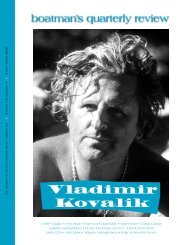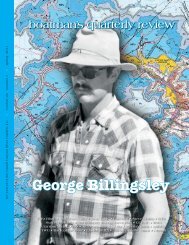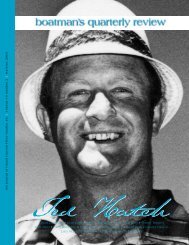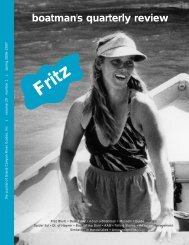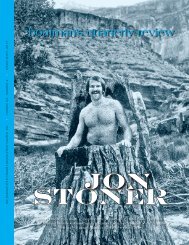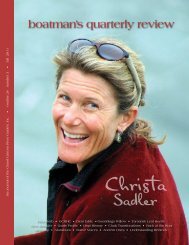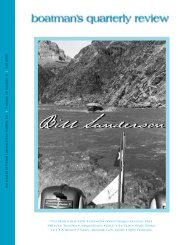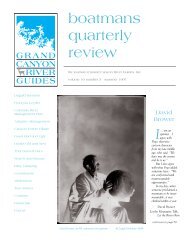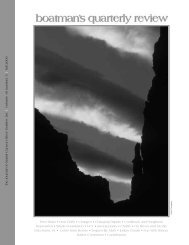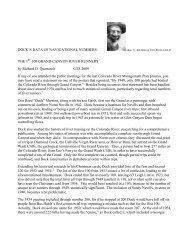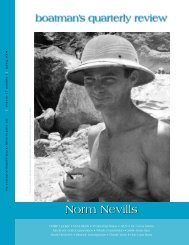Susan Billingsley - Grand Canyon River Guides
Susan Billingsley - Grand Canyon River Guides
Susan Billingsley - Grand Canyon River Guides
You also want an ePaper? Increase the reach of your titles
YUMPU automatically turns print PDFs into web optimized ePapers that Google loves.
Steiger: What year was that?<strong>Billingsley</strong>: I started in ’66.Steiger: Why did they feel that way?<strong>Billingsley</strong>: It was just women breaking into a man’scareer. You’d get the men up there and they’d be havinga great time and drinking and doin’ all these things, andthey just didn’t want women around. I never felt likethey needed to like me or even particularly want methere, I just felt like it was something that I could doand I enjoyed, and it was—to me I just ignored it all.They were pretty upset. But there wasn’t really anythingthey could do. I had just enough guy friends in forestrywho I hiked with, who kind of stood up for me a littlebit. But it worked out okay.Steiger: When you say “they,” who’s “they”?<strong>Billingsley</strong>: The faculty. I had, out of about six ofthem, I would say Dr. Womack and Dr. Kurmes wereprofessional and pretty supportive. The other four or fivewere just pretty obvious that they wished I wasn’tthere—Dr. Minor in particular. What he liked instudents were really smart, bright students. He was reallysharp himself, he did all the statistics and math classesfor forestry, and I was barely a “c” student in math, sonot only was I a woman, I wasn’t a very good studenteither. (laughs) I just wasn’t what he was looking for as afuture forester of America.Steiger: What was it about forestry that appealed toyou?<strong>Billingsley</strong>: Just being outside.Steiger: You were just looking for a job to do notindoors?<strong>Billingsley</strong>: Yeah. And you know, in Custer, SouthDakota, that’s the other major Ponderosa pine forest,and the biggest companies in town were lumber mills.My uncle had a lumber mill, so it was just somethingthat I had been around a lot as a kid; the timberindustry, the Forest Service was real big in that area.Steiger: How about your parents? Were theysupportive?<strong>Billingsley</strong>: They were. You know, you wouldn’tthink that… My mom and dad must’ve died a thousanddeaths for me. They were so good at letting me do whatI wanted to do, even though it was the last thing in theworld they particularly wanted for me. I don’t know verymany parents who were that supportive and just let mego ahead and try—do what I wanted to do.Steiger: What do you suppose they would havewanted for you?<strong>Billingsley</strong>: Oh, I would think to get a degree inanything other than forestry. (laughs) And certainly notget into horses or any of the other things I got into. Justhave a little easier time of it. My parents on the wholewere just amazing. My mom finished high school inthree years in Mississippi, and knew she wanted to getout and travel. She met my dad in Biloxi during the war,and when they got married, the only thing she wantedwas a travel trailer, because she was going to travel. Sothat’s what he built her. He built her a travel trailer, andthey parked it behind my grandparents’ house, and thereit sat while they raised four kids. (laughs)Steiger: So they didn’t go traveling?<strong>Billingsley</strong>: Not until they both retired and thenthey traveled all over the United States.Steiger: So you graduated with a degree in forestry?<strong>Billingsley</strong>: Uh-huh, 1971. Took me five years toget through it, not being the smartest one there.(laughs) So that was a good experience. Part of thereason I stayed for the whole five years was because wewere hiking in the <strong>Grand</strong> <strong>Canyon</strong> almost everyweekend, and it’s a little hard to get “a’s” if you’re goneevery weekend.Steiger: So you got kind of sidetracked by the <strong>Grand</strong><strong>Canyon</strong>?<strong>Billingsley</strong>: I wouldn’t say sidetracked, but I wouldsay that turned out to be a lot more important thanthinking of a career. There was just something about…What a wonderful time to be hiking in the <strong>Grand</strong><strong>Canyon</strong>. You could go as long as you wanted, anywhereyou wanted, on almost nothing, because gas was so inexpensive.We would pay ten cents a mile, each of us.We’d pile in the cars and we’d take off. Very seldom didwe ever bother with a permit. That wasn’t even verynecessary then. So we’d just take off and go. We wentjust about everywhere in there.Steiger: I kind of vaguely remember, gas must havebeen what, ten or twenty cents a gallon, if that?<strong>Billingsley</strong>: Yeah. It wouldn’t be anything to justjump in the car and go up to Blue Springs for theweekend. Sometimes we’d hike down in the morningand swim down at Blue Springs and hike out that afternoonand come back. That’s just about all we did, washike.* * *Steiger: So how did the river enter into it?<strong>Billingsley</strong>: Well, George wanted to go down so hecould look at geology. He did a trip—I don’t know whohe did it with—it may have been in 1968. Then he toldus how wonderful it was, so a bunch of us who hikedtogether decided to go down the river that summer.That was ’69. We hiked in and met a Hatch trip. Didthe lower half, and did some pretty good hikes off of thattrip.Steiger: So was that pretty much just the nauhiking club, kind of?<strong>Billingsley</strong>: Those trips in those days were big. Ithink there were forty people on that Hatch trip, and wewere only like nine of us from the hiking club.Steiger: Did Ellen Tibbetts go on that one?boatman’s quarterly review page 29



